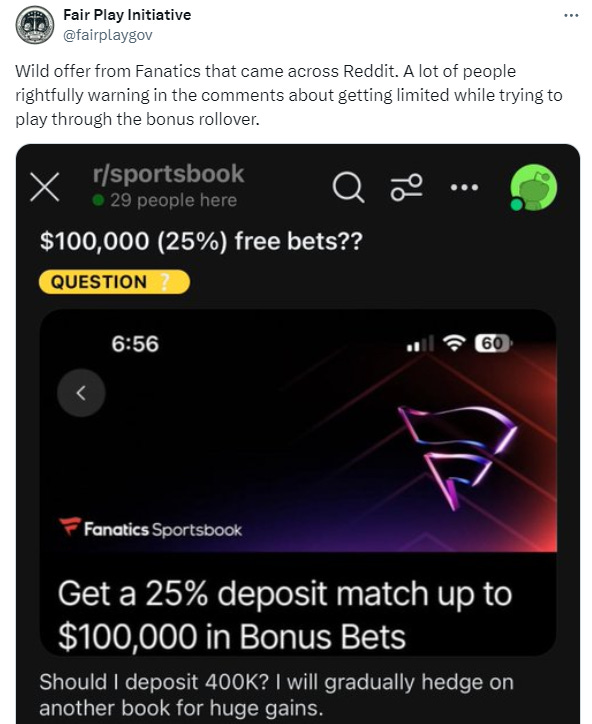Tug Of War
Missouri's sports betting ballot initiative gains support and opposition. California tribes are being pulled in two different directions. Sweepstakes divides industry experts.
The Bulletin Board
NEWS: Missouri sports betting ballot initiative picks up support and opposition.
WEEKEND CATCHUP: ESPN Bet launches in NY; Underdog Pick ‘Em returns to CO; DraftKings settles with SEC.
NEWS: Amelco pitches tribes to chart their own sports betting future.
BEYOND the HEADLINE: Two areas where CA tribes will not compromise.
AROUND the WATERCOOLER: Sweepstakes tête-à-tête goes public on LinkedIn.
STRAY THOUGHTS: The mother of all bonus offers.
SPONSOR’S MESSAGE - Sporttrade was borne out of the belief that the golden age of sports betting has yet to come. Combining proprietary technology, thoughtful design, and capital markets expertise, our platform endeavors to modernize sports betting for a more equitable, responsible, and accessible future.
“Sporttrade is now live in Arizona on Android and iOS!”
Good News-Bad News for Missouri Sports Betting
The Missouri sports betting ballot initiative received two key endorsements last week. The leading gubernatorial candidates, Lt. Gov. Mike Kehoe (R) and Rep. Crystal Quade (D), said they support Amendment 2 during a debate on September 20.
That was the good news. There is also some meh news and some bad news.
The meh news is the polling coming out of the Show-Me State. The latest polling indicates growing support for the measure, but I would caution that the measure is far from a sure thing.
Eilers & Krejcik Gaming (a newsletter sponsor) said in its latest Sports Betting Policy Monitor ($), “Assuming the vote is as close as recent polling indicates, and knowing the havoc negative campaigns can wreak, we remain slightly lean-negative on Amendment 2’s passage odds.”
And the bad news is who has come out in opposition to the sports betting ballot initiative: The Kansas City Teachers Union.
The proposal is being sold as a way to increase education funding, but that might be a very tough sell. The Kansas City Teachers Union calls Amendment 2’s unknown revenue a promise the state cannot keep.
“One thing you can’t do is make promises in salaries, and this money is supposed to go raise teacher salaries, and you can’t commit to how much money is going to go to salaries,” AFT 691 President Jason Roberts argued. “That’s a terrible idea. Let’s say they commit to us they’re going to give us $5 million for teacher raises for next year. So, we anticipate that $5 million and build that in and spend it. Well, what if they suddenly only give us $2 million? Who has to make up the other three because we have a collective bargaining agreement with the district to do that.”
The opposition group (which includes casino giant Caesars), Missourians Against the Deceptive Online Gambling Amendment, claims that the measure “would enrich online, out-of-state gambling corporations while creating special loopholes that would allow them to pay zero dollars to Missouri.”
Contrary to fears that operators will write off promotional spending and contribute very little tax revenue to Missouri, a report from EKG forecasts that as much as $105 million over the first five years would go to Missouri public schools.
The 23-page report (commissioned by the pro-side) estimates that legalized sports betting would produce $47.5 million in revenue and $4.7 million in taxes over the first 12 months of the industry.
Weekend Catchup: ESPN Bet in NY; Underdog Pick ‘Em Returns to CO; DraftKings Settles with SEC
ESPN Bet officially official in New York: ESPN Bet officially launched in New York on Friday. The launch coincided with marketing campaigns featuring several ESPN personalities, including Stephen A. Smith and Mike Greenberg, all touting special offers — I’ve also seen affiliates offering a “First Bet Reset” up to $1,000 offer. The big question is, can ESPN Bet crack the New York code and leverage the ESPN brand to capture New York market share?
Underdog Pick ‘Em contests return to Colorado: Last week, I mentioned Underdog Fantasy had returned to Kansas. This week, the company’s Pick ‘Em contests are back in Colorado after Underdog made several changes to the offering, including increasing the minimum age to 19 and switching the contests to peer-to-peer. "The Division of Gaming engaged us in a thoughtful process and concluded our peer-to-peer game meets the state’s fantasy sports standards,” Stacie Stern, Underdog’s senior vice president of government affairs, told Action Network.
DraftKings pays $200k to settle SEC charge: DraftKings agreed to pay a $200,000 penalty for “selectively disclosing material, nonpublic information to investors who followed or otherwise viewed the company CEO’s social media accounts without disclosing that same information to all investors” according to a release from the US Securities and Exchange Commission. The charge stems from a July 27, 2023, post on the X account of DraftKings CEO Jason Robins that said, “The company continued to see “really strong growth” in states where it was already operating.”
SPONSOR’S MESSAGE - Underdog: the most innovative company in sports gaming.
At Underdog we use our own tech stack to create the industry’s most popular games, designing products specifically for the American sports fan.
Join us as we build the future of sports gaming.
Visit: https://underdogfantasy.com/careers
B2B Sports Betting Suppliers Woo Tribes
Tribes present one of the biggest growth opportunities in US sports betting, particularly in California. And while FanDuel and other commercial operators are trying to mend fences and work with California tribes, B2B companies like Kambi and Amelco are crossing their fingers that those relationships fall apart so they can offer a soft landing spot for tribes.
As Victor Rocha said on my podcast in May, the tribes will decide when and how sports betting happens, which includes being the forward-facing brand: “After creating these land-based entities, why would we allow our online presence to be eclipsed by FanDuel and DraftKings?”
Rocha added that if the big operators don’t like it, “There are other white-label companies that will come in and fill the spot if those guys don’t want to play.”
Enter Amelco.
“We’ve been working with the tribal community for quite some time now,” Amelco Head of Business Development Brandon Walker told SBC Americas in a lengthy, candid interview.
Walker pointed to its relationship with the Quapaw Nation in Arkansas (Saracen Casino) and the Seminole Tribe in Florida (Hard Rock Bet).
“I strongly believe that tribal operators have a huge opportunity to amass market share and compete with the biggest commercial brands, especially in states such as Oklahoma and California,” Walker said. “These two states are huge for tribal gaming, so we’re looking to enter these states and work alongside the tribes to create the best possible gaming experiences that are completely tailored to them.”
The entire interview is a fascinating look into the dynamics at play in California and how the tribes are being pulled (persuaded) in two different directions.
STTP Thoughts: Mobile sports betting will require a compromise between California tribes and commercial sportsbooks.
Some suggest that tribes can do it alone and partner with B2B companies. However, I’m having trouble envisioning a world where the major online operators sit on the sidelines while tribes and B2B suppliers push through a mobile betting initiative in California. They would have to oppose such a measure, which could very well lead to another failed (and costly) ballot initiative, costing California tribes hundreds of millions of dollars and eating up several more years of precious time.
Yes, tribes hold the keys to the market, but they will need the expertise of commercial operators to get peak performance out of the car. Tribes are not mobile sports betting experts, and in a world where they partner with B2B suppliers, they would be in the driver's seat or have to pay someone to chauffeur them around (too many car analogies?). The suppliers aren’t going to supply that expertise for free, nor will they do the marketing for the tribes, as the major operators would.
So, while it sounds like tribes would get a bigger share of a smaller pie by cutting out the major players, that’s an untested theory. The options seem to be a revenue share agreement with major operators or partnering with suppliers and doing everything on your own — risk management, marketing, and everything else.
Beyond the Headline: Where CA Tribes Won’t Compromise
A deal in California will require both sides to compromise. Tribes will have to offer the commercial operators a financially feasible reason to get involved in the market, and commercial operators will need to make several assurances to the tribes.
As I wrote in August, the two deal-breakers appear to be:
There will be zero involvement in online casinos, now or in the future (which is the issue). Any inkling that commercial operators could push for online casino authorization would likely blow up any deal.
Tribal casinos will be the sportsbooks’ forward-facing brands. As Pechanga.net publisher Victor Rocha told me on a podcast appearance, there will be no erasure.
As Rocha said on the Indian Gaming Association’s New Normal webinar series last week, tribes aren’t looking for another Denali to Mount McKinley situation.
SPONSOR’S MESSAGE - Join 100s of operators automating their trading with OpticOdds.
Real-time data. Proven trading tools. Built by experts. Meet us at SBC Lisbon & G2E Vegas. Join top operators at www.opticodds.com.
Around the Watercooler
Social media conversations, rumors, and gossip.
Howard Glaser, Light & Wonder’s Global Head of Government Affairs and Legal Counsel, is waging what feels like a one-man war against the sweepstakes casino industry.
The issue is dividing the industry. The American Gaming Association is sympathetic to the cause, and while not as vocal or passionate as Glaser, plenty of folks are questioning the legality of the offerings.
And then there is the other side. As Chris Grove noted on Glaser’s LinkedIn post:
“You could write the same article about land-based casinos and pepper it with the hundreds of yearly violations of underage play, AML, RG failings, etc, at the state level.
“You could also write a similar article about your company's social casinos.
“What you've done here is nothing more than repost largely unsubstantiated claims of edge cases.
“You've never tolerated that approach when it's utilized by opponents of retail casinos or online casinos, so it's surprising to me that you're so eager to employ it when it suits your purpose here.”
“Essentially, this may not be a road sweepstakes naysayers want to travel. Either the technology works, and sweepstakes sites are using it, or it doesn’t, which opens the proverbial Pandora’s Box. And you better have your own house in order if you’re going to complain about AML deficiencies.”
Glaser invited Grove to participate in a G2E session on October 8th, titled The Growth & Challenges of “Sweepstakes” Operators:
“Unlicensed and unregulated “sweepstakes” casinos and sportsbooks have become a multi-billion-dollar market in the United States, all while operating without any oversight or generating tax revenue to states. What are sweepstakes casinos, and what are the implications for the legal, licensed gaming industry? This panel of experts will explore these questions and more as gaming regulators begin to take notice.”
Stray Thoughts
This came across my X feed last week, and it’s certainly a wild offer, if true…
According to Underdog Fantasy’s Dillon Borgida, the offer isn’t unheard of for certain VIP customers (Underdog is a newsletter sponsor):









